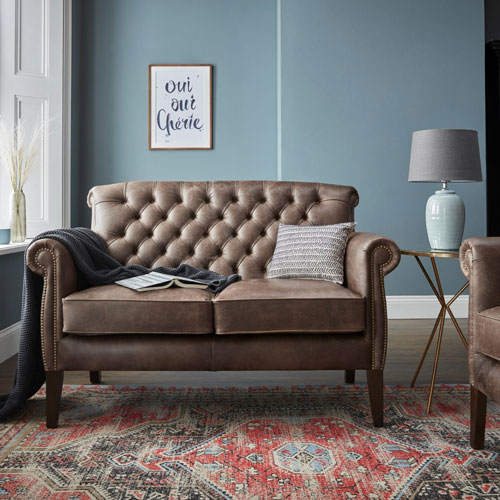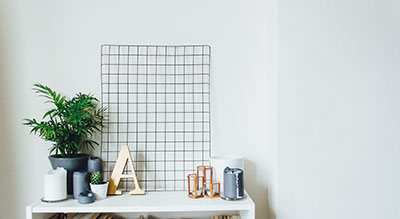4 ways to adapt your home to match your vegan and eco lifestyle
If you're living a vegan lifestyle or you're just looking to make your home more eco-friendly, here, Matt Deighton from Sofas by Saxon, gives his top tips to help you adapt your home.
With the threat of global warming a hot topic, the popularity of a vegan lifestyle is growing, with over 800,000 people cutting back on meat products for at least a month in 2019 (The Times). Not only does avoiding meat save the lives of millions of animals each year, but it also reduces the carbon emissions released at various stages of the farming and meat production process. In fact, eating meat just once or twice a week can add between 106–604kg of greenhouse gasses to your annual carbon footprint (BBC), which means you could be helping to significantly reduce carbon emissions by choosing a vegan lifestyle.
But, it's not just your diet that you should be focussing on. Many items of furniture don't match a vegan or eco-friendly way of life.
But there are plenty of ways you can adopt environmental and vegan-friendly furnishings in your home.
Go for faux or natural materials 
A leather sofa can make any home stylish and you don't have to miss out on this aesthetic if you're living a vegan lifestyle. Many furniture manufacturers make faux leather alternatives which look and feel like the real thing, without using any animal products. These are usually made from materials like polyvinyl chloride (PVC), polyurethane, cork or waxed cotton. Plus, all of these materials are easy to clean with soap and water, which means you don't need to use any chemical-based leather polishes to keep your furniture looking good as new.
If leather isn't your style, it's easy to pick out natural, plant-based materials for your interiors. Fabrics like cotton, bamboo, and linen can be great alternatives to wool and silk, and they are all biodegradable. Plus, their soft and luxurious feel makes them the perfect choice for pieces that require a bit more comfort, like sofas and rugs. For bigger, hardier furniture pieces, wood is a great choice as it's natural and durable. Just make sure you choose furniture made from wood that has a Forest Stewardship Council (FSC) certification so you know it's been responsibly sourced.
Choose animal-free paints
When shopping for the perfect paint to add a splash of colour to your walls, keep in mind that some mixtures contain animal products. For example, some red hues contain a dye derived from cochineal insects, while other paints can contain milk proteins, mainly from cows' milk.
Because veganism is on the rise, and thanks to a popularity boost from Meghan Markle who chose vegan-friendly wall paint for baby Archie's nursery, there are many vegan paints on the market. These are usually made from things like eucalyptus or graphene, which means they also contain a much lower level of harmful chemicals like volatile organic compounds (VOCs).
Opt for slow interiors
Approximately a third of UK homeowners have admitted to throwing away furniture that could have otherwise been donated, sold or recycled, according to a recent survey conducted by the British Heart Foundation. Instead, this furniture is sent to landfill or incinerated, where it can release harmful greenhouse gasses into the atmosphere. That's why choosing slow interiors that will last a lifetime, through a combination of quality manufacturing and timeless style, can help to make your home more eco- and vegan-friendly.
Of course, you want your home to reflect your personal style, but you should try to avoid choosing pieces that are designed around fleeting trends or could break easily. Instead, look for classic pieces made by a quality manufacturer to get the most from your furniture.
When you buy furniture pieces made from abroad, the vehicles us ed to transport your goods can contribute huge amounts of greenhouse gasses to the atmosphere. In fact, vehicles contribute for almost 30% of all carbon emissions produced (EPA). So, when you buy pieces made in Britain, your furniture usually has much less distance to travel, releasing fewer harmful gasses.
ed to transport your goods can contribute huge amounts of greenhouse gasses to the atmosphere. In fact, vehicles contribute for almost 30% of all carbon emissions produced (EPA). So, when you buy pieces made in Britain, your furniture usually has much less distance to travel, releasing fewer harmful gasses.
Furniture made in Britain must also adhere to much stricter guidelines in the manufacturing process than some other countries, which means you can be sure that you know exactly what you're getting. Where you can, try to visit the manufacturer in person so you can get a good feel of the work environment, production methods and materials. That way, you know they're authentic and that their pieces are made ethically and to a high quality.
If you're looking to cut back on animal products, these four tips will help you match your interiors to your lifestyle.
